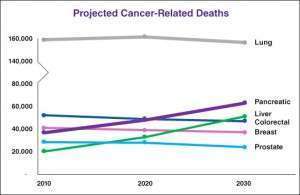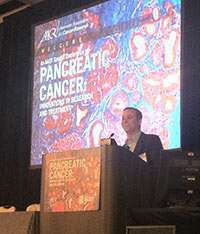
At the American Association for Cancer Research (AACR) special conference on pancreatic cancer, held in New Orleans May 18 to 22, the Pancreatic Cancer Action Network was in the spotlight. The organization’s paper predicting cancer incidence and death to 2030, published online in AACR’s prestigious journal Cancer Research on May 19 and announced in a press release, revealed a concerning finding that attracted notice at the conference and beyond. The conference also provided the pancreatic cancer research community with a valuable opportunity to share their latest findings and strengthen their ties.
 Startling Findings About Pancreatic Cancer
Startling Findings About Pancreatic Cancer
The Pancreatic Cancer Action Network paper highlighted the finding that pancreatic cancer will likely move from the fourth to the second leading cause of cancer-related death in the United States around 2020. It further predicted that by the year 2030, the top five cancer killers in the United States will be lung, pancreatic, liver, colorectal and breast, representing a dramatic shift from today’s top five causes of cancer-related death: lung, colorectal, breast, pancreatic and prostate.
The research was conducted under the leadership of Lynn Matrisian, PhD, MBA, vice president of scientific and medical affairs for the Pancreatic Cancer Action Network. With her guidance, the Research & Scientific Affairs team analyzed data and made predictions for changes in cancer incidence and death in the coming years. The full text of the paper is available here.
The publication of the study attracted significant media attention, with Dr. Matrisian featured on the CBS Evening News nationally and detailed articles appearing on CNN, in Time Magazine, and in many other publications. This level of attention has the tremendous benefit of raising awareness of pancreatic cancer and the critical work of the Pancreatic Cancer Action Network.

Pancreatic Cancer Action Network New Orleans Affiliate core role volunteers attended the first evening’s sessions and reception with Julie Fleshman (third from left).
Even more importantly, publication of this work within the scientific literature allows other researchers to read the results and cite this study when they discuss the grim statistics associated with pancreatic cancer.
A Valuable Opportunity for the Pancreatic Cancer Community
The conference was itself an invigorating experience for the nearly 500 pancreatic cancer researchers who were in attendance, representing more than 20 countries. It was a prime opportunity for the Pancreatic Cancer Action Network to advance its goal of building and strengthening a Community for Progress of researchers devoted to this disease.

Pancreatic cancer survivor Robb Lamont speaks at the opening plenary session of the meeting.
The opening session included an inspirational speech by Pancreatic Cancer Action Network volunteer and survivor Robb Lamont. Robb was diagnosed with pancreatic cancer at the age of 36 and is currently a four-year, eight-month survivor. Fighting his second recurrence of the disease, he commented that the sight of so many pancreatic cancer researchers in the same room brought him great hope. His words bolstered the resolve of everyone in the room.
The research talks delivered throughout the meeting covered topics such as novel strategies to detect pancreatic cancer earlier by blood test, the complex role of the dense stroma that surrounds pancreatic tumors, and ways to block the activity of the most commonly mutated protein in pancreatic cancer, KRAS.
An Important Role for the Organization
The Pancreatic Cancer Action Network played a significant part in initiating this important special conference hosted by AACR and has been a lead supporter both this year and in 2012, when the conference first took place. A remarkable number of research presentations cited funding from the Pancreatic Cancer Action Network as pivotal to the findings presented.
As financial support from the federal government becomes scarcer, the role of private funders like the Pancreatic Cancer Action Network is ever more key to the continuation of the great momentum in the field. This is a Community for Progress that deserves sustained support at the highest possible level in order to conduct more high-quality research and reverse the dire predictions highlighted in the Cancer Research paper.






